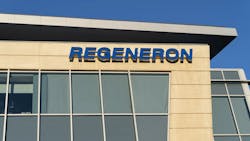Regeneron to invest $2B in a former magazine printing facility in New York
Biotechnology company Regeneron Pharmaceuticals is making a $2 billion investment in a recently purchased one million-square-foot facility in Saratoga Springs, New York, as part of a brownfield project that will include the design, reconstruction, and fit-out of the existing space, as well as the potential for future expansion.
The site in Saratoga County, which previously served as a magazine printing facility, will more than double Regeneron’s manufacturing capacity in the state, according to a press release from New York Governor Kathy Hochul.
The investment, which will create approximately 500 short-term design and construction jobs and at least 1,000 full-time permanent jobs, is meant to boost the company’s capabilities to manufacture medications to fight cancer and infectious diseases.
“The decision to build in Saratoga was an easy one,” Daniel Van Plew, Regeneron’s executive vice president and general manager for industrial operations and product supply, said in a statement. “The Capital Region is full of talented people and dependable partners. I’m genuinely excited that as Regeneron grows, so does our commitment to this community.”
The Tarrytown, New York-headquartered drugmaker announced in April that it acquired the Saratoga Springs facility “for production support activities and, potentially, additional manufacturing capacity.” At the time, Regeneron said it continues to “invest heavily” in the company’s New York State operations, including an approximately $3.6 billion expansion of its Tarrytown campus and the construction of a new fill-finish manufacturing facility in Rensselaer.
New York, North Carolina investments
During Regeneron’s third-quarter 2025 earnings call in late October, CEO Leonard Schleifer said that the drugmaker plans to invest over $7 billion in infrastructure and manufacturing facilities in New York and North Carolina over the coming years.
“We agree that investing in U.S. manufacturing is not only vital for creating jobs and strengthening our economy, but for safeguarding national security,” Schleifer told analysts.
In April, Regeneron announced a 10-year manufacturing supply agreement worth more than $3 billion with Fujifilm Biotechnologies to manufacture and supply bulk drug products at Fujifilm’s new Holly Springs, North Carolina campus — effectively doubling Regeneron’s U.S. large-scale manufacturing capacity.
Fujifilm Biotechnologies’ $3.2 billion cell culture manufacturing site in Holly Springs represents one of the largest commercial-scale cell culture biomanufacturing sites in North America, according to the company. At Fujifilm’s grand opening of the facility in September, Regeneron’s Van Plew remarked during a panel session that there’s a shortage of capacity in the U.S. and his company is making “major” investments in its home state of New York while it leverages Fujifilm’s infrastructure in North Carolina.
“The majority of the innovation in this space comes from the United States and having the ability to connect with operations in the U.S. matters,” Van Plew said. “These plants are large and expensive. There are significant efforts within engineering and other parts of this space to try to emulate biology. So, you’re trying to take steel and cause it to act like an organism to allow the cells to grow and do what they need to do to make the medicines, which translates into complexity.”
According to Van Plew, Regeneron is already one of the world’s largest manufacturers of biologics, but the company needs Fujifilm Biotechnologies as a contract development and manufacturing organization (CDMO) for the “back end” of the production process. Under the supply agreement with Fujifilm, he said Regeneron’s able to have greater certainty in access to capacity as well as the ability to adapt to pipeline and demand changes.
“We’re part of the same network,” Van Plew added. “For all intents and purposes, I do think of [Fujifilm] as an extension of my operations — and it goes both ways ... I don’t want to keep building plants.”
Partnering with the CDMO allows Regeneron to focus on its core strengths of “scaling up molecules, doing the transfers, and getting them launched,” he concluded. “I don’t want to be good much beyond that. For the back end of it, I want a company like a Fujifilm that can pick up that part of my business.”
About the Author
Greg Slabodkin
Editor in Chief
As Editor in Chief, Greg oversees all aspects of planning, managing and producing the content for Pharma Manufacturing’s print magazines, website, digital products, and in-person events, as well as the daily operations of its editorial team.
For more than 20 years, Greg has covered the healthcare, life sciences, and medical device industries for several trade publications. He is the recipient of a Post-Newsweek Business Information Editorial Excellence Award for his news reporting and a Gold Award for Best Case Study from the American Society of Healthcare Publication Editors. In addition, Greg is a Healthcare Fellow from the Society for Advancing Business Editing and Writing.
When not covering the pharma manufacturing industry, he is an avid Buffalo Bills football fan, likes to kayak and plays guitar.
